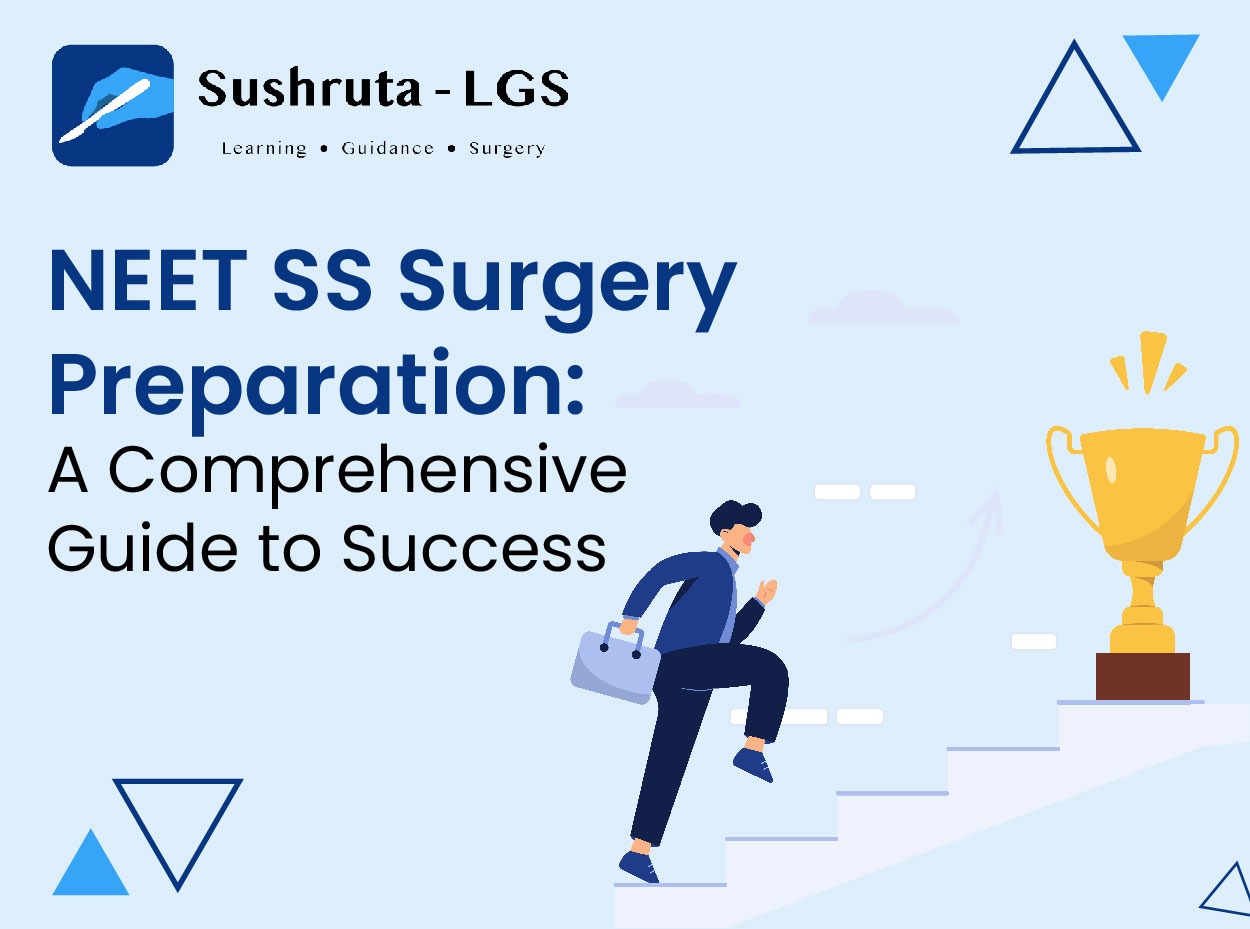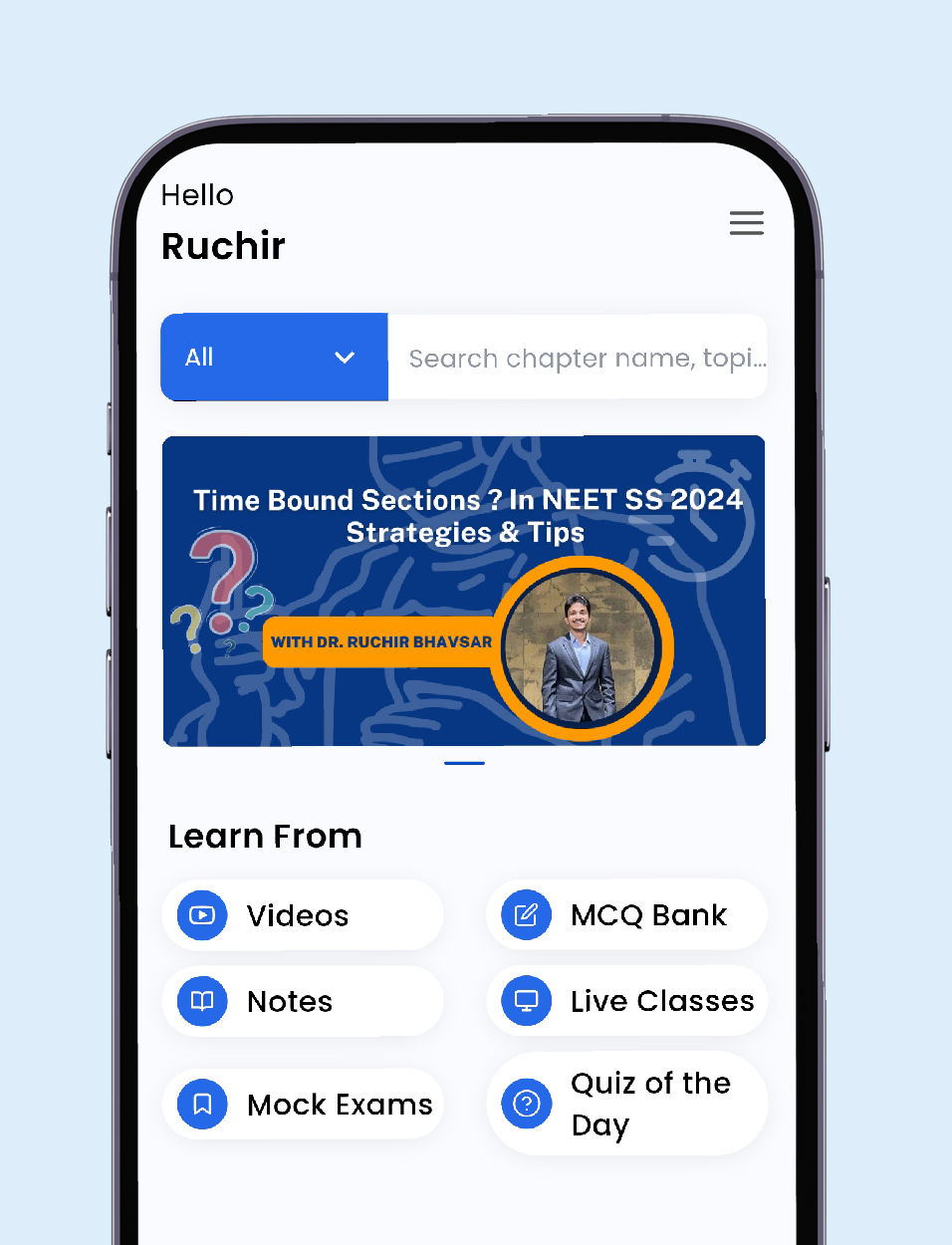Introduction: Stay Calm and Focused
Preparing for the NEET SS Surgery exam can be a daunting task, but with the right approach, you can navigate this journey with confidence. The primary aim of this guide is to help you remain calm and avoid anxiety regarding the exam dates. NEET SS Surgery is a challenging exam, but with a focused approach, honesty, dedication, and a clear strategy, you can excel. This guide is designed to provide you with detailed strategies on how to prepare efficiently and effectively, ensuring that you make the most of your study time and resources.
Step 1: Setting a Clear Target
The first and most crucial step in your preparation journey is to set a clear target. Your target should not merely be about the exam date or achieving a certain number of marks. Instead, aim high—your goal should be to secure Rank 1. Even if you don’t reach Rank 1, this mindset will push you to achieve the best possible outcome, which is ultimately your field of choice. Setting a high target gives you direction and motivation, which are essential for sustained preparation.
Step 2: Creating a Smart Study Plan
Once you have set your target, the next step is to create a study plan. This plan should be smart, specific, measurable, achievable, realistic, and time-oriented. Break down your study schedule into monthly, weekly, daily, and even hourly goals. For instance, decide what topics you will cover in the first few hours of the day and plan your study sessions accordingly. This structured approach will help you measure your progress and stay on track.
It’s important not to overshoot or undershoot your study goals. For example, if you plan to solve 200 MCQs in a day, make sure this is realistic based on your study pace. Everyone’s speed of learning differs, so tailor your schedule to suit your personal pace. By setting achievable targets and consistently meeting them, you’ll stay motivated and confident throughout your preparation.
Step 3: Consistency and Resilience
Consistency is key in your NEET SS Surgery preparation. It’s not enough to just make a study plan—you need to stick to it. Being consistent in your study habits will ensure steady progress and help you avoid last-minute cramming. Resilience is equally important; there will be days when things don’t go as planned, but it’s crucial to bounce back and stay committed to your goals.
Step 4: Choosing the Right Resources and Guidance
Selecting the right study resources is critical to your success. This includes not just books and notes, but also MCQs, online platforms, and guidance from mentors or educators. The resources you choose should align with your study schedule and help you prepare effectively. Regularly evaluate your progress to ensure that your preparation is on the right track. This doesn’t just mean taking mock exams a few months before the actual exam—evaluation should be a continuous process throughout your preparation journey.
Step 5: Time Management
Proper time management is the foundation of effective preparation. Without it, even the best study plans can fail. Make sure that you are allocating your time wisely, balancing between studying, solving MCQs, and revising. Regularly adjust your schedule to ensure that you are on track to meet your goals. Remember, it’s not about how much time you have, but how effectively you use it.
Step 6: Developing a Daily Milestone Routine
After setting your study schedule, it’s crucial to break it down into daily milestones. Divide your day into segments and assign specific tasks to each. For example, dedicate a certain number of hours to theory and another to MCQ practice. Achieving these daily milestones will give you a sense of accomplishment and keep you motivated.
Consistency in following this routine is vital. Whether you can study for two hours or ten hours a day, make sure you are consistent. Encourage yourself with positive reinforcement—acknowledge the progress you’ve made each day. This will help maintain your enthusiasm and prevent burnout, which is a common issue for students preparing for competitive exams.
Step 7: Balancing Theory and MCQ Practice
A critical aspect of your preparation is finding the right balance between theory and MCQ practice. Initially, focus more on understanding the theory—around 60% of your time should be dedicated to theory, while 40% should be spent on MCQs. As you progress, you can adjust this balance.
When practicing MCQs, it’s important not to solve them immediately after studying a topic. Instead, wait a few days before attempting related MCQs. This will test your ability to recall information and reinforce your learning. Always try to practice in test mode to simulate the exam environment and improve your time management skills.
Step 8: The Importance of Revision
Revision is a crucial step that cannot be overlooked. Your study plan should include at least two rounds of revision before the exam. This will help reinforce your knowledge and reduce confusion during the exam. Many students struggle with choosing between two similar options in the exam—thorough revision helps mitigate this issue.
Make sure your revision schedule is realistic and that you stick to it. The goal is to ensure that you are confident and well-prepared when the exam day arrives.
Revising and Practicing MCQs: A Balanced Approach
In the initial stages of your preparation, focusing more on theory and less on MCQs is advisable. However, as you approach the exam date, this ratio should shift. In the final few months, your preparation should prioritize solving MCQs while maintaining a steady revision of theory. This shift ensures that you are not only well-versed in the theoretical aspects but also proficient in applying that knowledge under exam conditions.
When solving MCQs, it’s crucial to adopt a test-mode approach. This means setting aside a specific amount of time—be it 30, 60, or 90 minutes—based on the number of questions you intend to solve. After completing the test, evaluate your performance to identify any mistakes and understand why they occurred. Regular self-evaluation helps you pinpoint your weaknesses and provides insights into areas that require further attention.
It’s important to note that full-scale mock exams are best reserved for the last two to three months of preparation. Engaging in mock exams too early can lead to discouragement if you’re not fully prepared. Instead, focus on building a strong foundation by clearing your theory and revising consistently.
Textbook Selection: What to Read and How to Read It
Choosing the right textbooks and study materials is a key part of your preparation. Among the recommended books, Bailey & Love’s Short Practice of Surgery and Sabiston Textbook of Surgery are essential. If time permits, reading additional materials can provide an extra edge, but if you’re pressed for time, focusing on these two books should suffice.
Smart Reading of Sabiston
Sabiston Textbook of Surgery should be approached differently than Bailey & Love. Sabiston is rich in trials, studies, and detailed explanations that may seem overwhelming at first. The key is to focus on the conclusions and key takeaways from each study rather than getting bogged down in every detail. During your first reading, skim through the text to identify the most important points. Subsequent readings should focus on these key areas, allowing you to consolidate your knowledge without spending unnecessary time on less critical information.
For example, when studying the chapter on shock, it’s more important to understand the fundamental concepts such as hypothermia and the basic physiological responses rather than memorizing every study mentioned in the text.
If you’re using study notes, whether from our platform or another, your first reading should be a combination of the notes and the textbooks. This helps you understand the context and importance of each point in the notes. Once you’ve done this, you can rely more on the notes for revision, using them alongside MCQ banks, charts, and videos.
Adapting to a Busy Schedule: Tips for Working Professionals
For those balancing work with their NEET SS preparation, managing your time effectively is critical. It’s common to feel overwhelmed by the limited hours available for study, but it’s important to focus on making the most of the time you do have.
Drawing from my personal experience during my fellowship in surgical gastro and liver transplant at Gangaram, where the duties were intense, I found that accepting the limited study hours and maximizing their use was key. Instead of stressing about the lack of time, view the few hours you have as an opportunity to study with maximum focus and efficiency.
Preparing for INI SS and NEET SS Simultaneously
If you’re preparing for both INI SS and NEET SS, it’s important to understand that these exams require different strategies. INI SS requires a focus on specialty textbooks, while NEET SS is centered around general surgery.
If you’re planning to sit for both exams, you can prepare smartly by allocating 60-70% of your study time to specialty subjects for INI SS until the exam date. After INI SS, shift your focus entirely to general surgery to prepare for NEET SS. This approach ensures that you are well-prepared for both exams without compromising on the depth of your knowledge in either area.
For those starting INI SS preparation now, it’s crucial to be thorough with the specialty subjects. If you feel that you cannot commit fully to INI SS at this point, it may be better to focus solely on NEET SS and tackle INI SS in the future.
Efficient Use of Study Notes
If you’re short on time and prefer using notes over textbooks, it’s still advisable to keep the textbooks handy. As you go through the notes, refer to the textbooks for any tables, charts, or additional information you feel may enhance your understanding. This approach allows you to maximize your study efficiency without missing out on important content.
The preparation journey for NEET SS Surgery is demanding, but with a well-structured plan, smart use of resources, and consistent effort, success is within reach. Stay focused, stay dedicated, and remember to evaluate and adapt your strategy as you progress.
Completing the Syllabus Before Revision
As you continue with your preparation, one of the key strategies to keep in mind is the importance of completing the syllabus before starting your revision. While revising earlier topics through MCQs is beneficial, it’s crucial not to divide your focus between completing the syllabus and revising at the same time. A more effective approach is to first finish the entire syllabus and then allocate time specifically for revision. This ensures that you have a solid foundation and can focus on reinforcing your knowledge without the distraction of unfinished topics.
When preparing for the NEET SS exam, especially in your final year, it’s advisable to rely heavily on Bailey & Love’s Short Practice of Surgery and Sabiston Textbook of Surgery along with previous years’ questions. These resources are comprehensive and cover all the essential aspects you need to focus on.
Choosing the Right Edition: Why the Latest Matters
A common question that arises during preparation is whether to use an old edition of a textbook if you’ve already started with it. My strong recommendation is to switch to the latest edition as soon as possible. Textbooks like Sabiston and Schwartz are constantly updated to reflect new trials, studies, and recommendations. Reading from an outdated edition can leave you with gaps in your knowledge, especially in areas where there have been significant updates.
If you’ve marked important sections in your old edition, you can still keep it for reference. However, your primary focus should be on the new edition to ensure you’re studying the most current information.
Mock Exams: A Vital Part of Final Preparation
Mock exams are a critical part of your final preparation. If the NEET SS exam is scheduled for February or March, we plan to start mock exams around November. These will be held three months before the exam to allow you ample time to evaluate your performance, identify weaknesses, and make necessary improvements.
Using both old and new editions of textbooks during these mock exams can be helpful. The old edition provides familiarity, while the new edition ensures you’re not missing out on any updated information. This combination will help you approach the exam with confidence.
Utilizing Test and Discussion Sessions
If you’re following our test and discussion sessions, they can be a great asset in your preparation. These sessions are designed to reinforce your learning through practice and detailed discussions. Even if you’re starting late, you can still catch up by solving the old tests and watching the corresponding discussion videos. These resources are tailored to help you strengthen your understanding of key topics and improve your performance in the actual exam.
For those who have started their first reading late, aim to complete it by late October to early November. This timing will give you sufficient time to focus on revision, which is essential for consolidating your knowledge. However, if your first reading extends into December, don’t panic. Even one to two months of focused revision can be sufficient if planned properly.
Tailoring Your Study Plan to Your Pace
Remember, the speed at which you study and revise is highly individual. Your study plan should reflect your personal pace. If you can revise an entire syllabus in one month, then plan your first reading accordingly. If you need two months for revision, adjust your initial study schedule to allow for that.
Ultimately, your study plan should be flexible and tailored to your strengths and weaknesses. The goal is to ensure that you enter the exam well-prepared, with a thorough understanding of the material and the ability to apply it effectively.
Conclusion
Preparing for the NEET SS Surgery exam is a significant undertaking that requires dedication, strategy, and perseverance. By setting clear goals, creating a smart study plan, and being consistent in your efforts, you can navigate this challenging journey successfully. Remember to use the latest resources, focus on completing the syllabus before revision, and tailor your study plan to your pace. With the right approach, you can achieve your goal and secure a top rank in the NEET SS Surgery exam. If you have any further questions or need personalized advice, feel free to reach out. Best of luck with your preparation!





